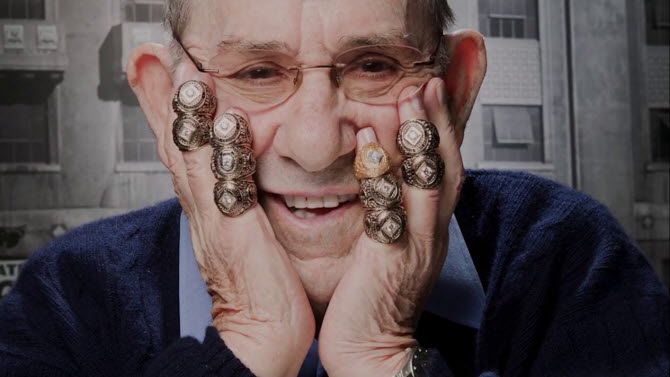To be frank with you, I only vaguely heard a bit about Yogi Berra once before watching documentary film “It Ain’t Over”. Berra was a legendary baseball player mostly known for his rather humorous quotes, and the documentary shows that he was much more than that, and I found the documentary quite informative and engaging despite being a nerdy South Korean dude who does not have much interest in any sports, let alone baseball.
After the prologue part showing Berra somehow overlooked in the 2015 national poll for the greatest living baseball players in US, the documentary immediately goes back to his early years. He was born to a poor Italian immigrant family living in St. Louis, Missouri, and he already showed considerable potential as an athlete even when he was very young. In 1942, he eventually entered the Minor League as a new rookie to watch, but then he willingly joined the US Army as the country belatedly went into the World War II, and he actually participated in the Normandy Landings in 1944.
Shortly after the war was over, Berra went back to the Minor League as playing for the New York Yankees, and it did not take much time for him to rise to the Major League as he quickly became quite prominent as a skillful batter. Mainly due to his rather plain attitude and appearance, he also drew lots of attention for being a sort of oddball among his more prominent fellow team members including, yes, Joe DiMaggio, and the documentary shows us how much he was caricatured in public even during that time.
However, Berra did not give much damn about that as going his way as usual, and he gradually became someone who did a lot more than being an endearing mascot of his team. Under his new team manager who was quite strict and demanding to say the least, he trained himself a lot for playing as a catcher, and his team members came to depend more on him on the field before. Any good catcher was supposed to be constantly aware of lots of elements on the field besides those balls to catch, and Berra’s considerable experience as a catcher later helped him move onto the next step of his professional career.
Even as his popularity went up and up, Berra remained humble and casual as he was before. When the Brooklyn Dodgers, which could have Berra in 1942 if its team president handled the situation more honestly, had Jackie Robinson as the first African American Major League player, Berra did not hesitate to welcome Robinson even though they were going to play against each other as much as possible. As a matter of fact, they later had one unforgettable moment to remember on the field, and that was actually one of a few times when Berra happened to lose his usual laid-back attitude. He often insisted during the rest of his life that the umpire made a wrong judgment at that moment, though, as far as I can see, Robinson did arrive at the spot right before Berra caught the ball.
Around the early 1960s, Berra came to see that he was not young enough to play on the field, and he subsequently became the new manager of the New York Yankees in 1963. His first several years as a team manager had a fair share of ups and downs, and then he unfortunately got fired, but he quickly moved to the New York Mets. Although nobody expected that much from this, Berra surprised everyone as making the New York Mets have much more victories than expected, and that was the main reason why the New York Yankees eventually brought him back later.
Next several years was another career highlight for Berra, but this glorious period was unfortunately ended with a very bitter moment. In 1985, he was callously fired by the team owner, and that certainly hurt his feeling a lot. In fact, he swore that he would not be associated with the New York Yankees at any chance, and he stuck to his pledge until he came to have a moment of reconciliation with the team owner in public around 15 years later.
Meanwhile, Berra’s public image grew more as usual. He often appeared in a number of commercials, and his amiable appearance was certainly crucial in the success of these commercials. Furthermore, his jolly persona also inspired a certain classic TV animation series I often watched when I was a kid (My little musing: “So that was the reason why his name felt so familiar to me at first….”).
The documentary sprinkles several amusing quotes from Berra along its narrative, and I must say that, as many interviewees in the documentary in the film ranging from Derek Jeter to Billy Crystal agree, these quotes are not merely funny but actually quite meaningful in plain sight. One of the most famous sayings of his is “It ain’t over ‘til it’s over”, and this rather silly quote really tells much about his attitude about his life and career. After all, he surely went on and on for fully living his life until it was really over for him, and that will make you admire him more as a wise and decent human being.
Overall, “It Ain’t Over” is a loving and insightful tribute to Berra’s life and career, and director/writer Sean Mullin did a commendable job of juggling various archival records and interview clips. Berra was indeed one of the greatest figures in the American baseball history, and some of those plain but undeniably wise quotes of his may stay in your mind for a while after you watch this wonderful documentary.





![Lake Dillon and a Tree [In Explore] Lake Dillon and a Tree [In Explore]](https://live.staticflickr.com/65535/53731226172_4004cbfea4_s.jpg)





Pingback: 10 movies of 2023 – and more: Part 2 | Seongyong's Private Place